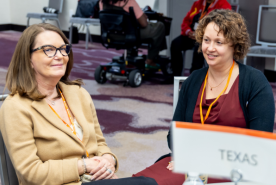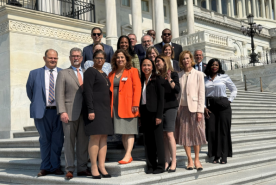December 19, 2023
We believe in a future where everyone who needs a kidney should get a kidney. We launched Transplants for All to make our dream a reality. Our goal is to double living and deceased donations by 2030 while fighting for increased health equity in transplant.
What is Transplants for All, and how will it make a difference in the lives of people with kidney disease? Morgan Reid, National Kidney Foundation’s (NKF) Transplant Policy and Strategy Director, and Haley Jensen, NKF’s Transplant Programs Director, explain this and more.
What is Transplants for All?
Transplants for All is a combination of all the work we do to push transplant equity forward.
“The first pillar of our work is living donation–many people don’t know that it is safe to donate a kidney. We developed educational materials to explain the risks and benefits of donation. The second pillar is increasing deceased donation by improving the transportation and data management systems,” Jensen said. “The last pillar is increasing fair access to transplant and minimizing social determinants of health. Removing race from the eGFR equation was a huge first step. Now we hope to remove race from the Kidney Donor Risk Index (KDRI). Race and ethnicity have no place in medical equations.”
Through these pillars, NKF will create a more patient-centric system where everyone is equally cared for. To ensure we meet this goal, NKF is bringing healthcare professionals, policymakers, and patients together.
“We’re focusing on patient education, research, innovation, policy, and advocacy to solve these problems,” said Jensen. “We want all patients to know kidney transplants are a choice and empower them to pursue it. We also want to educate providers and have them take advantage of new innovations to help patients get transplanted.”
By advocating for kidney equity, we are creating a healthcare system where everyone has an equal chance at a healthy life. We need your help to make this happen!
Advocating for better policies
NKF’s advocacy platform, Voices for Kidney Health, is always working to give the kidney patient community the best shot at living long, healthy lives. One way is through the Transplant Equity Bill.
“This bill dismantles barriers that patients face when accessing transplants–especially the data component. The data from referral to evaluation and the waitlisting stages needs to be collected and shared. We need to know who is making it through the evaluation process so we can create solutions that ensure no one falls through the cracks,” Reid said. “We want to end transplant disparities that underserved groups, rural populations, and marginalized communities face.”
Voices for Kidney Health advocates aren’t stopping there, though. They are working to pass several more bills that protect patients, increase kidney donations, and secure funding. See all the ways you can take action today.
“We are trying to pass the Living Donor Protection Act (LDPA) at the federal level. It will ensure life and disability insurance companies can’t discriminate against living donors. LDPA has been passed in over 30 states, but we want protection for all living donors, no matter where they live,” said Reid. “You, reading this article, can help! Whether you are a patient, caregiver, or friend, I invite you to advocate. You have the power to make change happen by sharing your voice."
Become a Voices for Kidney Health advocate today and influence public policy through simple activities like emailing or tweeting your legislators.
Increasing education and support
Legislative changes can take a while. In the meantime, NKF is supplying education to patients who need to navigate the current transplant system.
“We have many transplant education and support programs including Big Ask Big Give and Kidney Learning Center. Both programs cover kidney transplant basics, how to find a living donor, and how to become a living donor,” said Jensen. “Big Ask Big Give is a live event that patients can attend in person or virtually. Kidney Learning Center is an online platform that offers free self-paced courses.”
Our programs support patients beyond education.
“We want to be there for kidney patients at every step of the journey as much as we can. NKF Cares Hotline, our free patient education center, does that,” Jensen said. “Anyone can call or email our trained professionals to get answers to any kidney-related question they have.”
Education is important but so are the emotional aspects of getting a kidney transplant. That’s why we created NKF Peers. This program connects kidney patients and potential donors with a mentor who has been there themselves.
“NKF Peers makes an enormous difference to those considering transplantation. It can also help people going through the process, those post-transplant, those on dialysis,” said Jensen. “NKF Peers connect kidney patients to a trained mentor who’s walked in their shoes. They can talk about challenges and the scarier parts of kidney disease.”
By advocating for better policies, supporting people with kidney disease, and educating people about their risk factors, NKF believes we can create a more equitable transplantation system.
See all the ways NKF can support you on your kidney transplant journey.


















